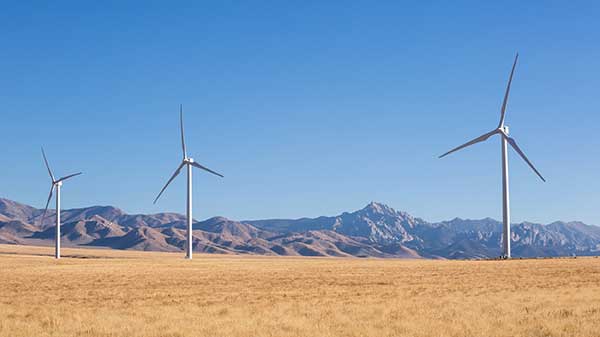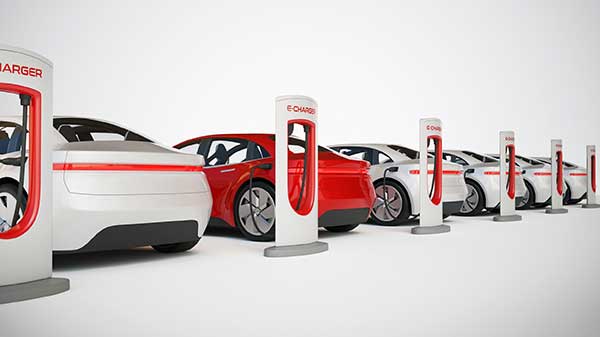This week’s Energy News Week in Review features companies and countries from around the world — from Ireland to Iraq. Many projects have been planned to harness renewable energy and to prioritize sustainability initiatives.
Trump’s Bid To Change Desert Renewable Energy Conservation Plan Halted
The Biden administration and its Department of the Interior (DOI) has officially announced that it would not entertain comments on proposals to amend the Desert Renewable Energy Conservation Plan (DRECP).DRECP).
In a last-minute proposal before leaving office, Trump had sought to invite comments on an environmental impact statement designed to curtail the extent of conservation management and protected areas in the Southern California desert.
In a bid to make more land available to solar and wind energy developers before he left office. Trump’s proposal sought to weaken or eliminate the DRECP’s conservation management plans that made huge swaths of the desert off-limits.
The DOI said there was no basis for amending the DRECP, which it described as “a landscape-level plan that streamlines renewable energy development while conserving unique and valuable desert ecosystems and providing outdoor recreation opportunities.” The plan was designed to balance the goals of enabling renewable energy development and environmental protection of the desert.
The DRECP covers nearly 11 million acres of deserts in California and Colorado. It was agreed upon following eight years of negotiations and faced no subsequent lawsuits.
It has met with opposition from solar and wind developers because it bars them from access to millions of acres for their projects.
DOE Announces Funding for Groundbreaking Geothermal Energy Projects
The Department of Energy (DOE) announced on February 24 that it was allocating up to $46 million for enhanced geothermal systems (EGS) projects that could provide carbon-free and reliable electricity for millions of American homes.
The awards focus on enhanced geothermal systems rather than conventional ones, which have physical limitations and occur naturally. Enhanced geothermal systems are manmade and have the potential to greatly expand the country’s renewable energy resources.
Seventeen projects have been selected for funding. The DOE press release said, “Awardees will gain a fundamental understanding of the key mechanisms controlling EGS success; develop, test and improve new techniques in an ideal EGS environment; and rapidly disseminate technical data and communicate lessons learned and best practices to the public.”
Though the U.S. has substantial geothermal reserves, currently its renewable energy portfolio comprises only 2% of geothermal energy.
$2 Billion Carbon Capture Project Planned for Midwestern Biorefineries
Biorefineries in Iowa, Minnesota, North Dakota, and South Dakota have agreed to work with Summit Agricultural Group, an agribusiness and investment management firm, in the first phase of its carbon capture and storage project. It’s expected to begin operations in 2024.
The goal of the Summit Carbon Solutions CCS project is to lower the carbon footprint of the participating companies and to help them in achieving their goal of net-zero carbon production.
During ethanol production, biorefineries generate carbon dioxide. The biorefineries involved in this project will compress the carbon dioxide into a liquefied form, which will then be transported through a $2 billion pipeline that will run through the four states. The pipeline will lead to an underground storage facility in North Dakota once the requisite approvals are received.
The project is expected to remove as much as 10 million tons of carbon dioxide annually and to generate as many as 10,000 jobs. Green Plains Inc. and Corn, LP are among the biorefineries signing onto the project. signing onto the project.
Iraq Invests in Solar Power To Boost Energy Infrastructure
Iraq is currently in talks with foreign firms to build solar power infrastructure across the country that will supply 750 megawatts of solar power. Iraq is currently in talks with foreign firms to build solar power infrastructure across the country that will supply 750 megawatts of solar power.
The country hopes to generate 10 gigawatts of solar power by 2030 in a bid to solve its ongoing electricity supply problems.
Currently, Iraq uses very limited solar, mainly to power street lamps.
Iraq obtains the bulk of its electricity supply from Iran, around 1,200 megawatts daily. Iraq spent around $50 billion over the past two decades on efforts to rectify its failing electricity supply with limited success.
Australian Green Hydrogen Project a First for Brazil
Australian renewable energy company Enegix has launched a $5.4 billion green hydrogen project in the northeast of Brazil.
Enegix says the project will “produce enough green hydrogen to power the lives of over 200 million people in developing economies without emitting any carbon.”
Ceará, a state in Brazil, was chosen as the site for the green hydrogen hub because it provides strategic access to all major international markets, the company said.
The state’s government, private sector, and university have signed a memorandum to collaborate with Enegix on the three-year project.
Danish Investment Firm To Build Green Ammonia Facility
Shipping and agricultural firms have signed a memorandum of understanding with Copenhagen Infrastructure Partners (CIP) for the establishment of a green ammonia facility.
CIP says the facility is to be located in the west of Denmark and will be the largest zero-carbon ammonia production facility in Europe. The ammonia will be produced from power generated by offshore wind turbines.
The ammonia produced will be used in the agricultural sector for fertilizer and the shipping sector for fuel. It is expected to reduce emissions from those sectors by 1.5 million tons annually.
The company estimates it will need $1.2 billion to build the facility, which is expected to begin operating in 2026 once sufficient investment is procured.
Shipping company Maersk and ferry operator DFDS have signed onto the project. Both companies are seeking to achieve carbon emissions reductions in their operations.
British Gas Places Major Order With Vauxhall for Electric Fleet
British Gas recently placed what has been described as the U.K.’s largest order for commercial electric vehicles (EVs) with carmaker Vauxhall.
The energy company recently ordered 2,000 EV vans from Vauxhall to add to the 1,000 it ordered in 2020. British Gas says it has made plans to stop buying internal combustion engine vehicles.
The move is in keeping with the company’s goal to have its entire fleet of 12,000 working vehicles be electric by 2025, well-ahead of the deadline set by the U.K. government.
British Gas’ parent company Centrica also entered into a three-year agreement for the installation of EV chargers at all company sites.
Barclays Announces Partnership To Launch Climate Change Index
Barclays Bank recently announced the launch of a new financial index that will help investors identify companies that are working to reduce carbon emissions.
The index was created by the financial indexing firm Solactive and will be available exclusively for products offered by Barclays.
Named the Solactive Climate Change Europe BTI index, it “tracks and invests in European companies which are aligned with a 2°C global warming scenario through to 2050 and maximizes investor exposure to companies with emission reduction targets,” the Barclays press release said.
Ireland Pours Millions Into Retrofitting Homes for Energy Efficiency
The Republic of Ireland’s government has announced it will be putting 45 million euros into retrofitting social housing to reduce energy-related carbon emissions.
The government said in a recent press release it was committed to retrofitting 500,000 homes by 2030, with around 36,000 of these being social housing, known as local authority-owned homes.
Outlining the benefits, the press release said that retrofitted homes would “be warmer, easier to heat and more comfortable.” It went on to say that the program “will enhance air quality in the home and for those currently using oil or gas they will see savings on energy bills.” The new retrofitting program will also go deeper than the one carried out in 2013.
Currently, 40% of Ireland’s energy-related carbon emissions come from buildings.
New Energy Efficiency Appliance Labels Go Into Effect in the EU
On March 1, 2021, the EU will begin wide-scale adoption of a new energy efficiency labeling system for appliances to make it easier for consumers to understand the energy performance of electrical goods.
The European consumer organization BEUC said fewer than one in four Europeans were able to correctly interpret the ratings under the old system and the new labeling will help consumers make better choices when buying appliances.
Initially, the new labels will be on a limited range of appliances, including refrigerators, televisions, and dishwashers. After March 18, 2021, appliances in these categories using the old labeling system cannot be sold in European stores.
Opinion writer: Jewel Fraser
The opinions, beliefs, and viewpoints expressed by the various authors do not necessarily reflect the opinions, beliefs, or viewpoints of Interactive Energy Group, LLC (IEG) or its parent companies or affiliates and may have been created by a third party contracted by IEG. Any content provided by the bloggers or authors are of their opinion and are not intended to malign any individual, organization, company, group, or anyone or anything.
Brought to you by energysavings.com
All images licensed from Adobe Stock.
Featured image:



